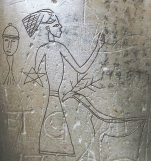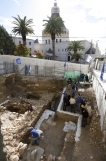An Israeli geologist has claimed to have found evidence to support his belief that the bones of Jesus and his family are contained in a stone box discovered in Jerusalem.
Geo-archaeologist Arye Shimron, with Canadian- Israeli film-maker and journalist Simha Jacobovici a long-time campaigner on the issue, says that he has found chemical evidence connecting the James Ossuary – a 1<sup>st-century stone box with an inscription saying "James, son of Joseph, brother of Jesus" – with the so-called Jesus Family Tomb. The tomb was discovered in 1980 in East Talpiot and contains ossuaries (bone boxes) with the inscriptions "Jesus, son of Joseph", "Maria," "Joseph," another "Mary," "Yose" or James, "Matthew" and "Judah, son of Jesus."
Shimron says that the evidence points to this being the tomb of Jesus and his family.
This is quite different from the New Testament account, isn't it?
Yes. The New Testament speaks of Jesus' parents Mary and Joseph and his brother James, but it does not say that he ever married or had children. It is generally assumed that he did not. Moreover, the Bible says that he was raised and ascended to heaven; however that's understood, the idea that he was peacefully buried in the normal way is a considerable departure from biblical orthodoxy.
There are quite a few familiar names there. Is it just a coincidence?
Yes. The names were all extremely common in New Testament times. It's a bit like someone finding graves with the names Victoria, Albert and Edward and assuming they've found the real resting places of royalty. Shimron does quote some (disputed) statistics about how likely it would be to find all these names together, but there is absolutely no evidence at all that they belonged to the family of Jesus of Nazareth.
What's with the James Ossuary, anyway?
It was found in 2002 and its authenticity was immediately challenged, with its owner accused of forging the inscription or part of it. He was found not guilty, but the judge said that the acquittal "does not mean that the inscription on the ossuary is authentic or that it was written 2,000 years ago". Now Dr Shimron has done a chemical analysis of the box and found that it matches conditions in the "Jesus Family Tomb", which implies that it was originally there with the other ossuaries; he says that the number of names from the same family is too great for coincidence.
How convincing is his reasoning?
If you are a Christian who takes the Bible account seriously, you certainly start with a bias against it. However, even if you have no theological dog in the fight, it is highly improbable. If the Bible is reliable enough to give us the right names of Jesus and his family, it is also reliable enough to tell us where they were from – and there's absolutely no reason why people from Bethlehem should be buried in Jerusalem. Also, Jesus was crucified. If he was raised, there were no bones to bury; if he wasn't, his body was either thrown into a lime pit where it was consumed (the usual way) or if it was given to his family it was buried in Joseph of Arimathea's tomb – and there's no mention of an ossuary.
So it's all a bit Dan Browny?
Frankly, it is a bit like that. Shimron and Jacobovici are placing a huge weight on very, very slender foundations. It requires us to believe radical contradictions at the same time – that the Bible is simultaneously reliable and unreliable – and it is fair to say that their view has no traction at all among mainstream scholars.
Makes you wonder why certain websites ran it, really.
There does seem to be a fascination with the life of Jesus even among people who aren't exactly orthodox Christians. Some of it's just New Atheist conspiracy theory, along the lines of "Isn't the Church wicked, hiding the facts from us for all these centuries?" This is frankly tripe. But some of it might reflect a desire to connect with spiritual things, alongside a sense that the Church isn't really the place to go looking. That's rather sad, but it does provide an opportunity to say that the real Jesus is much more interesting than the imitations.















